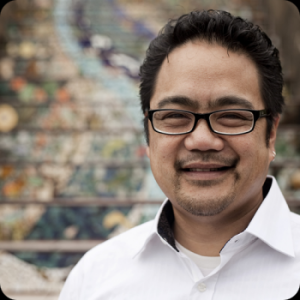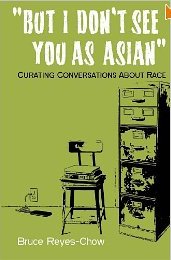“But I Don’t See You as Asian”: A Conversation with Bruce Reyes-Chow – Part Two
 Director’s Note: This week, our conversation is about Bruce Reyes-Chow’s 2013 book But I Don’t See You as Asian: Curating Conversations on Race. Today, Bruce and I discuss issues raised in the book.
Director’s Note: This week, our conversation is about Bruce Reyes-Chow’s 2013 book But I Don’t See You as Asian: Curating Conversations on Race. Today, Bruce and I discuss issues raised in the book.
Cynthia Holder Rich – You talk about privilege – are you writing for or to people with privilege?
10/13/03 BRC – Both. One of the hardest parts about having conversations about race is that the easy targets are White straight dudes. Now this is in no way giving permission for my White straight dude friends to check out of the conversation, but sometimes in our need to name the privilege of others, we fail to recognize the privilege that we have.
Now in no way do I want to encourage any kind of “oppression Olympics” where we try to decide who is the least privileged, but only to acknowledge that this privilege conversation is not as simple as we would all like it to be.
As I talk about in the book, while there may not be access given to me because I am Asian, I know that being male has certainly helped me in my own life. I am also straight, physically abled, married with children. All of these realities have given me unspoken access and appreciation by some areas of the church and society that my female, LGBTQ, disabled, single and/or childless are not afforded.
So, my being “BOTH” privileged and without privilege is very real and hopefully, through the claiming of my own duality, folks can claim those places in their own lives.
 CHR – Talk about the open-source approach. You are a proponent of it. Say more about what you see as the benefits, particularly as they impact conversations on race.
CHR – Talk about the open-source approach. You are a proponent of it. Say more about what you see as the benefits, particularly as they impact conversations on race.
0/13/03 BRC – An open-source setting makes it possible for previously excluded voices to have access to those conversations either to intentionally listen or to actively contribute. There are many settings where this could take place both informally or planned and either face-to-face or in an online setting. An example of why open-source culture can be important is that too often, conversations about race are usually framed around historic Black and White relations. Important, certainly, but not the only framework for talking about race. With Asian American as the fastest growing immigrant group, the Latino/a population in the US growing in significant percentages and historic Native American exclusion continuing to be manifested, open source allows those voices to be part of the conversation without having to be officially invited or even known. The number of times that I have met amazing people, heard powerful stories and/or simply had my perspectives shifted by the voices of people simply jumping in are too numerous to count.
CHR – Open source also leads to commentary, including commentary from many people who seem uninformed and ready to be rude and even hateful online. How do you see this in terms of conversations about race? When you have talked about race online, how have you handled the opening of the floodgates to people who revile and persecute you and call you all kinds of names…not to be too biblical! But what is the ultimate good that comes from opening the input path to everyone? What is the big goal of this kind of approach?
0/13/03 BRC – As most people have seen, conversation online around passionate issues: race, sexuality, politics, faith, guns, war . . . heck even sports teams can turn ugly really fast. Not a Social Media training that I conduct goes by without someone stating the “But online interaction is always so nasty” position.
Yes, it CAN be, but I would offer two responses to this.
First, I don’t think it happens as much as we would like to think it does; but just like every other mode of communication, for better or for worse, our attention is drawn to the things that excite, enrage and titillate. I am not sure how many people I am friends with, are followed by and/or are otherwise connected to online, but I am sure it’s over 10,000 different people. I am not one to shy away from difficult topics and the percentage of negativity that is directed towards me is negligible. In fact, because I try to be as open to perspectives as I can while being passionate about what I believe, over time, the conversations and opinions expressed around race as well as other difficult topics have become even stronger. In the end, my social media thread is overwhelming, filled with the wonderfully mundane happenings in people’s lives — and that is the greatest gift of open source community.
Second, when nastiness is shared, I think it’s a wonderful opportunity to model the kind of interaction that we would hope to be the norm. Sometimes that is inviting people into deeper conversations, other times it’s challenging folks to change their tone and perspective and, yes, sometimes it is disengagement and separation. All can be valid and useful ways to change the overall culture around online interaction. What we must not do is to reciprocate the same kind of vitriolic rhetoric device tactics that we so abhor simply because it was sent our way first. For in the few times that such negativity is directed towards us, many can be powerful opportunities to instead respond in a way that directly challenges it as the norm.


I am a white, male dude. I grew up with ridicule and rejection. It made me develop a huge inferiority complex. I become pretty self-destructive, too. All this set me many years back, I felt.
Over time God taught me some important lessons. One was, to take responsibility for my actions (stop blaming others). Another one was to teach me that I am very important in God’s eyes, and that everybody else is, too. Christ died for us!
I also came to see that my inferiority complex was caused by wanting to be better (if not the world’s best!) in some areas of my life, and that I in my selfpity really was blaming God for not putting me together with better parts and not making me grow up in better circumstances! I not only was humbled and confessed this attitude as sin, but chose to thank and praise God for putting me together just the way he had and gave me the circumstances in which I grew up! I now believe that God in his love and wisdom did the very best for me.
I think all people have inner and/or outer setbacks and challenges (Albert Einstein was was not exactly handsome…) I desire for all people to experience God the way I described here, and know the joy that have come into my life. Thanks be to God.